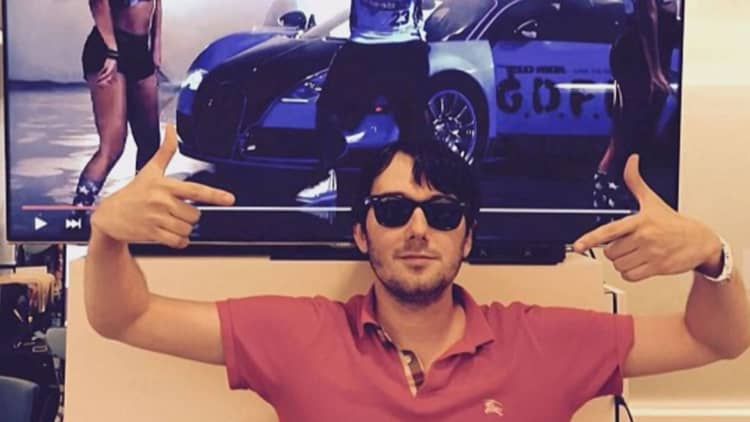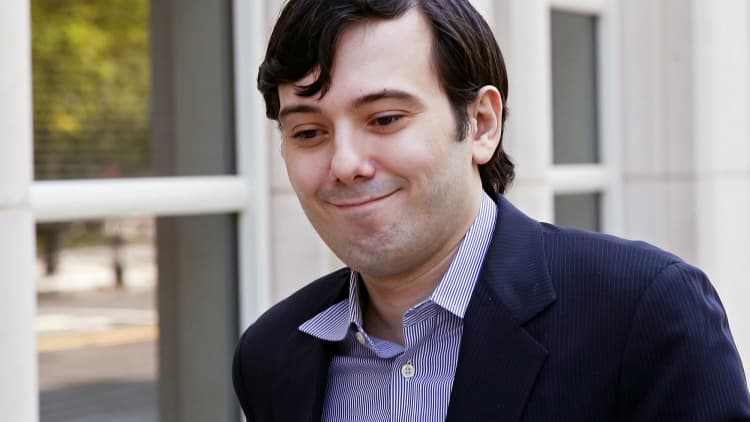Martin Shkreli has some questions about... Martin Shkreli.
Prospective jurors at the upcoming trial of accused securities fraudster Shkreli will have to answer a special questionnaire about the notorious pharma bro if his criminal defense attorneys get their wish.
Benjamin Brafman, Shkreli's lead lawyer, on Wednesday told Brooklyn U.S. District Court Judge Kiyo Matsumoto during a hearing that he wants a special set of questions posed to would-be jurors in addition to the normal array of queries asked of them.
Brafman said the small series of questions "specifically relate to Mr. Shkreli." He said that having potential jurors answer them on paper could avoid awkward situations where they verbally blurt out less-than-flattering answers about Shkreli that could affect other jurors who previously had no negative opinion of him.
Asked after the hearing by CNBC what he wanted to ask jurors, Brafman said, "Questions."
Asked specifically what kind of questions he would ask, Brafman quipped, "Good ones."

Brafman's request reflects the fact that there has been an enormous amount of negative publicity about Shkreli independent of the pending criminal case against him in Brooklyn federal court, where his trial is scheduled to begin in late June. Shkreli, and his lawyers, have good reason to fear that his notoriety could bias potential jurors against him.
Shkreli, 34, first came to public attention, and drew widespread scorn, in the summer of 2015, after the pharmaceutical company he headed at the time, Turing Pharmaceuticals, acquired an old anti-parasite medication and raised its price by more than 5,000 percent. Critics, who included members of Congress, and then-presidential candidates Donald Trump and Hillary Clinton, blasted him for the price hike of a drug used to treat pregnant women and people with HIV, among others.
Shkreli reveled in the negative attention, and used Twitter and other social media platforms to heap disdain on his critics, who included a member of the rap group Wu-Tang Clan, whose one-of-a-kind album he had purchased for $2 million. During an appearance before a Congressional committee, Shkreli smugly refused to answer questions.
Matsumoto told Brafman, "I don't have an objection one way or the other to a questionnaire" for jurors. Brafman told her he would discuss the potential questions with prosecutors to make sure both sides agree on them.
Earlier in the hearing, another lawyer for Shkreli, Marc Agnifilo, argued that prosecutors not be allowed to use certain documents that he said they obtained from Shkreli's other former drug company, Retrophin, that actually belonged to two hedge funds that Shkreli had previously run. Agnifilo argued Shkreli's Fourth Amendment right protecting him from unreasonable search and seizure by the government might have been violated in regards to those documents.
Shkreli is accused of looting Retrophin out of millions of dollars to pay back investors in the hedge funds whom he also allegedly defrauded. The hedge funds were both partially known by the initials MSMB.

Agnifilo noted that the situation involving Shkreli and Retrophin is "unusual" because Retrophin clearly wanted him to be prosecuted criminal after the company ousted him as CEO in 2014.
The lawyer said that Retrophin and MSMB shared a single computer server, but that their respective documents were on separate areas of the server, and protected by separate passwords.
Agnifilo said that he does not know how Retrophin obtained material relating to MSMB, but said, "they gave the government... MSMB material," in addition to Retrohin documents.
However, Agnifilo conceded that the defense does not know which, if any of those MSMB documents, might have been acquired by prosecutors through a source other than Retrophin. If the government separately acquired all such documents, it would mean Shkreli would not have a right to suppress them from being used at trial.
But Agnifilo met pushback on his argument from both prosecutors and the judge.
Mastumoto noted that Shkreli's contract with Retrophin required him to comply with company policies, and one of those policies was that employees did not have a right to privacy in their emails and other electronic communications on company computer systems. Matsumoto also questioned the idea of Shkreli having a right to the MSMB documents being kept out of the government's hands, as opposed to MSMB, as a corporate entity, having that right.
And Mastumoto also questioned why Shkreli had not removed the MSMB documents and taken them with him after he was ousted by Retrophin.
"He left them on the server," the judge said.
Assistant United States Attorney Alixandra Smith said that the claim that there were separate passwords and just one computer server for Retrophin and MSMB documents was not previously made in the defense's motion to suppress the MSMB evidence.
"This is the first time we're hearing this argument," Smith said.
Smith also noted that neither Shkreli, nor his lawyers, has submitted an affidavit attesting to the truth of the claim that there were separate passwords, and that in the more than one year since Shkreli was indicted, the defense has not identified any individual MSMB documents that had not been obtained by the government other than from Retrophin.
Smith said that Shkreli had routinely used his MSMB email address to conduct Retrophin business.
The defense will have time before trial to identify any specific documents it believes should be suppressed, and remount its argument about them.
The hearing came a week after Matsumoto granted Shkreli's request that he be tried separately from his former business lawyer Evan Greebel.
Matsumoto ruled that Shkreli's constitutional right to a fair trial would be at "serious risk" if he was tried alongside Greebel, particularly since Greebel's criminal defense attorney had threatened to act as "a second prosecutor" against Shkreli.
Shkreli, 34, will go on trial first, beginning June 26. Greebel, who also had asked for a separate trial, will be tried at a later date yet to be determined.
Greebel's lawyer Reed Brodsky had warned Matsumoto that if the two men were tried together, he would attack Shkreli as "a liar and a deceiver "who was guilty of both the charges in this case, as well as other uncharged crimes.
"We will be duty-bound to destroy Mr. Shkreli's credibility," Brodsky said at a prior hearing. "We are going to be an echo chamber with the government in terms of Mr. Shkreli's lies."
Shkreli refused to answer reporters' questions either on his way into the hearing, or as he walked out of it with his lawyers.
Clad in white pants, and a dress shirt, he dashed across the street outside the courthouse in downtown Brooklyn, and hopped into a yellow taxi cab after hailing it.
A courthouse worker, watching the scene, said, "You'd think with all his money, that guy would have a limo out here waiting for him."
Or at least, the worker said, "An Uber."


